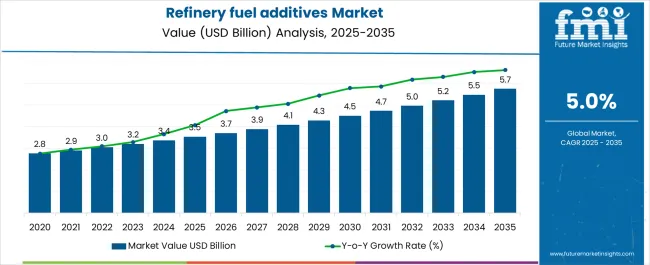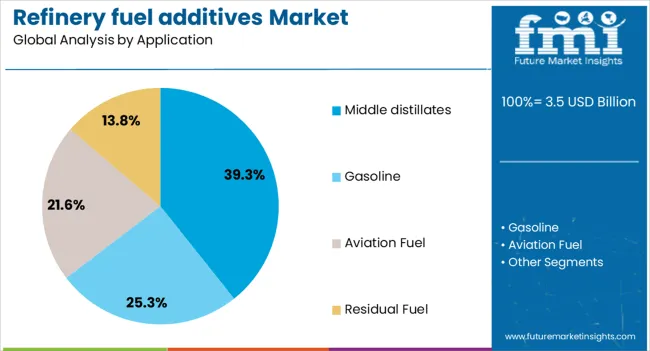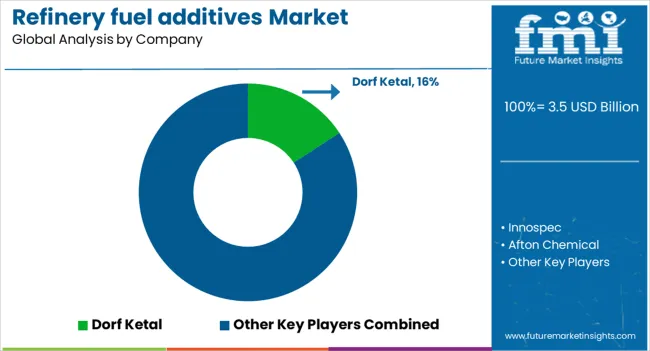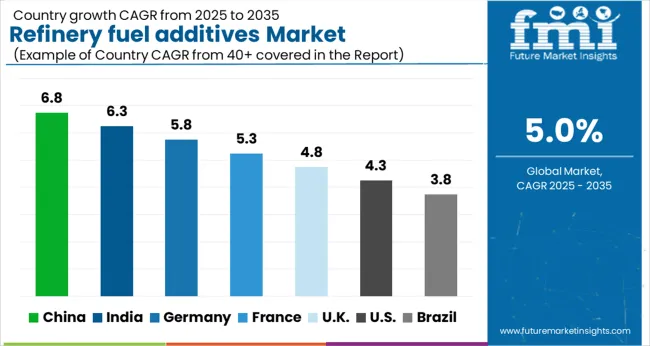The Refinery fuel additives Market is estimated to be valued at USD 3.5 billion in 2025 and is projected to reach USD 5.7 billion by 2035, registering a compound annual growth rate (CAGR) of 5.0% over the forecast period.

| Metric | Value |
|---|---|
| Refinery fuel additives Market Estimated Value in (2025 E) | USD 3.5 billion |
| Refinery fuel additives Market Forecast Value in (2035 F) | USD 5.7 billion |
| Forecast CAGR (2025 to 2035) | 5.0% |
The refinery fuel additives market is experiencing steady growth, supported by the rising demand for cleaner fuels and the increasing emphasis on meeting stringent environmental regulations worldwide. Fuel additives are being recognized as essential in improving fuel quality, enhancing combustion efficiency, and reducing emissions across diverse refinery applications. Investments in refining infrastructure and upgradation projects are creating strong opportunities for the integration of advanced additive formulations.
Growing demand for middle distillates and transportation fuels is further stimulating the need for performance-enhancing additives that extend engine life and optimize fuel efficiency. Advancements in additive chemistry, alongside innovations in multifunctional formulations, are enhancing fuel stability and supporting compliance with evolving global emission standards.
As the refining industry transitions toward low-sulfur and cleaner fuel production, the use of additives is becoming increasingly important to ensure performance consistency Expanding consumption of fuels across industrial, automotive, and aviation sectors is expected to reinforce the growth trajectory of the market, with significant focus on sustainability and operational efficiency.
The refinery fuel additives market is segmented by type / functionality, application, and geographic regions. By type / functionality, refinery fuel additives market is divided into Deposit Control, Antioxidant, Corrosion Inhibitors, Lubricity Improvers, Cetane Number Improvers, Octane Number Improver, Anti-icing, Conductivity Improver, Hydrogen Sulfide Scavengers, and Others. In terms of application, refinery fuel additives market is classified into Middle distillates, Gasoline, Aviation Fuel, and Residual Fuel. Regionally, the refinery fuel additives industry is classified into North America, Latin America, Western Europe, Eastern Europe, Balkan & Baltic Countries, Russia & Belarus, Central Asia, East Asia, South Asia & Pacific, and the Middle East & Africa.
The deposit control segment is projected to hold 20.3% of the refinery fuel additives market revenue share in 2025, establishing it as a significant contributor within the market. Growth in this segment is being driven by the increasing need to maintain fuel system cleanliness and prevent deposit formation, which can reduce engine efficiency and raise maintenance costs. Deposit control additives are being widely used to ensure optimal combustion, improve injector performance, and sustain fuel economy over longer operating cycles.
Rising fuel quality requirements and stricter environmental regulations are compelling refiners to integrate deposit control solutions into their formulations. Continuous development in additive chemistry is improving their effectiveness across a variety of fuel grades, supporting widespread application in both light and heavy fuel oils.
The segment’s growth is further supported by its ability to reduce harmful emissions, meet regulatory compliance, and enhance operational reliability for end users These benefits collectively reinforce its growing adoption across global refining operations.

The middle distillates segment is anticipated to account for 39.3% of the refinery fuel additives market revenue share in 2025, making it the leading application area. This dominance is being driven by the high global demand for diesel and jet fuels, which constitute a significant portion of the refinery output. Fuel additives play a critical role in improving the performance, storage stability, and emissions profile of middle distillates, ensuring they meet increasingly strict international fuel quality standards.
The segment is experiencing growing adoption due to the rising use of diesel in transportation, power generation, and industrial operations across both developed and emerging economies. Continuous investments in upgrading refining capacities are further stimulating demand for additives tailored to middle distillates.
The ability of these additives to minimize wear, control deposits, and improve combustion efficiency is contributing to long-term reliability and fuel economy As demand for high-quality middle distillates continues to rise globally, the application of refinery fuel additives in this segment is expected to maintain its leadership position.
Refinery fuel additives are basically the chemicals which are used in various kind of refinery fuels to enhance their performance characteristics. Regulations from various government and environmental agencies to curb emissions and improving overall fuel efficiency is putting a substantial impact on fuel components and complete engine system.
Refinery fuel additives play a significant role in increasing the performance and efficiency of various kinds of fuel used. Increasing the efficiency of refinery fuel is very important in two ways such that fuel, as we know it, is a non-renewable material. To conserve it is as equivalent as producing. Besides, the emissions caused by fuel are extremely harmful for human health and environment. These refinery fuel additives help the efficiency of fuels to increase and enhanced characteristics such as reduced emissions, improvement in octane number, improved cetane numbers etc. Fuel additives can reduce the corrosion effects caused by fuels inside of the engines. They also improve the combustion properties of fuels.
Owing to these benefits, global enterprises are evolving in their research and development activities to produce more advanced refinery fuel additives, giving a fast impetus in their demand as well as growth in the overall market. The user friendly, commercial as well as ecological and environmental advantages offered by refinery fuel additives are anticipated to trigger a high demand of these products over the forecast period of 2025-2026.
The enhanced performance features and ecological benefits, backed and governed by various government and environmental organizations are pushing the demand of refinery fuel additives globally. Refinery fuel additives increase several characteristics of different types of fuels. Refinery fuel additives not only help to meet the quality specifications of finished fuels but also facilitate operations within the refinery and deliver additional revenue and margin improvement in the whole business.
Advantages and benefits offered by refinery fuel additives such as cleaner engines, less pollution, improved engine ignition, less gumming and icing and higher fuel efficiency are driving their market globally while various national and international organizations are backing and supporting their regular use.
Along with having so many advantages, the additional cost of refinery fuel additives play a negative role in the growth of this market, especially in developing nations which are cost-sensitive. Along with this, use of other fuel options such as LPG and CNG also pull back the usage of refinery fuel additives among consumers.
Based on geography, the global refinery fuel additives market is segmented into the seven main regions, namely North America, Western Europe, Eastern Europe, Latin America, Middle East & Africa, Asia Pacific and Japan. North America is the leading market for refinery fuel additives, while Asia-Pacific is the fastest growing market for refinery fuel additives owing to growing demand for clean fuels mainly from the emerging economies such as China and India.

Global refinery fuel additives market is emerging with significant growth rate. Some of the major players functioning in global refinery fuel additives market are The Lubrizol Corporation, Innospec Inc., Fuel Performance Solutions, Inc., Infineum International Ltd., BASF SE, Chevron Oronite Company LLC, Total Petrochemicals, Evonik Industries AG and Dorf-Ketal Inc. etc.
The report is a compilation of first-hand information, qualitative and quantitative assessment by industry analysts, inputs from industry experts and industry participants across the value chain. The report provides in-depth analysis of parent market trends, macro-economic indicators and governing factors along with market attractiveness as per segments. The report also maps the qualitative impact of various market factors on market segments and geographies.

| Country | CAGR |
|---|---|
| China | 6.8% |
| India | 6.3% |
| Germany | 5.8% |
| France | 5.3% |
| UK | 4.8% |
| USA | 4.3% |
| Brazil | 3.8% |
The Refinery fuel additives Market is expected to register a CAGR of 5.0% during the forecast period, exhibiting varied country level momentum. China leads with the highest CAGR of 6.8%, followed by India at 6.3%. Developed markets such as Germany, France, and the UK continue to expand steadily, while the USA is likely to grow at consistent rates. Brazil posts the lowest CAGR at 3.8%, yet still underscores a broadly positive trajectory for the global Refinery fuel additives Market. In 2024, Germany held a dominant revenue in the Western Europe market and is expected to grow with a CAGR of 5.8%. The USA Refinery fuel additives Market is estimated to be valued at USD 1.3 billion in 2025 and is anticipated to reach a valuation of USD 1.9 billion by 2035. Sales are projected to rise at a CAGR of 4.3% over the forecast period between 2025 and 2035. While Japan and South Korea markets are estimated to be valued at USD 171.1 million and USD 91.1 million respectively in 2025.
| Item | Value |
|---|---|
| Quantitative Units | USD 3.5 Billion |
| Type / Functionality | Deposit Control, Antioxidant, Corrosion Inhibitors, Lubricity Improvers, Cetane Number Improvers, Octane Number Improver, Anti-icing, Conductivity Improver, Hydrogen Sulfide Scavengers, and Others |
| Application | Middle distillates, Gasoline, Aviation Fuel, and Residual Fuel |
| Regions Covered | North America, Europe, Asia-Pacific, Latin America, Middle East & Africa |
| Country Covered | United States, Canada, Germany, France, United Kingdom, China, Japan, India, Brazil, South Africa |
| Key Companies Profiled | Dorf Ketal, Innospec, Afton Chemical, BASF SE, Total, ECIC, Infineum, Racheme Fze, Clariant, Callington Haven, WRT BV, and Nalco |
The global refinery fuel additives market is estimated to be valued at USD 3.5 billion in 2025.
The market size for the refinery fuel additives market is projected to reach USD 5.7 billion by 2035.
The refinery fuel additives market is expected to grow at a 5.0% CAGR between 2025 and 2035.
The key product types in refinery fuel additives market are deposit control, antioxidant, corrosion inhibitors, lubricity improvers, cetane number improvers, octane number improver, anti-icing, conductivity improver, hydrogen sulfide scavengers and others.
In terms of application, middle distillates segment to command 39.3% share in the refinery fuel additives market in 2025.






Our Research Products

The "Full Research Suite" delivers actionable market intel, deep dives on markets or technologies, so clients act faster, cut risk, and unlock growth.

The Leaderboard benchmarks and ranks top vendors, classifying them as Established Leaders, Leading Challengers, or Disruptors & Challengers.

Locates where complements amplify value and substitutes erode it, forecasting net impact by horizon

We deliver granular, decision-grade intel: market sizing, 5-year forecasts, pricing, adoption, usage, revenue, and operational KPIs—plus competitor tracking, regulation, and value chains—across 60 countries broadly.

Spot the shifts before they hit your P&L. We track inflection points, adoption curves, pricing moves, and ecosystem plays to show where demand is heading, why it is changing, and what to do next across high-growth markets and disruptive tech

Real-time reads of user behavior. We track shifting priorities, perceptions of today’s and next-gen services, and provider experience, then pace how fast tech moves from trial to adoption, blending buyer, consumer, and channel inputs with social signals (#WhySwitch, #UX).

Partner with our analyst team to build a custom report designed around your business priorities. From analysing market trends to assessing competitors or crafting bespoke datasets, we tailor insights to your needs.
Supplier Intelligence
Discovery & Profiling
Capacity & Footprint
Performance & Risk
Compliance & Governance
Commercial Readiness
Who Supplies Whom
Scorecards & Shortlists
Playbooks & Docs
Category Intelligence
Definition & Scope
Demand & Use Cases
Cost Drivers
Market Structure
Supply Chain Map
Trade & Policy
Operating Norms
Deliverables
Buyer Intelligence
Account Basics
Spend & Scope
Procurement Model
Vendor Requirements
Terms & Policies
Entry Strategy
Pain Points & Triggers
Outputs
Pricing Analysis
Benchmarks
Trends
Should-Cost
Indexation
Landed Cost
Commercial Terms
Deliverables
Brand Analysis
Positioning & Value Prop
Share & Presence
Customer Evidence
Go-to-Market
Digital & Reputation
Compliance & Trust
KPIs & Gaps
Outputs
Full Research Suite comprises of:
Market outlook & trends analysis
Interviews & case studies
Strategic recommendations
Vendor profiles & capabilities analysis
5-year forecasts
8 regions and 60+ country-level data splits
Market segment data splits
12 months of continuous data updates
DELIVERED AS:
PDF EXCEL ONLINE
Fuel Additives Market Segmentation based on Type, Application, and Region: Forecast for 2025 and 2035
Marine Fuel Additives Market
Aviation Fuel Additives Market Growth 2025 to 2035
Specialty Fuel Additives Market Size and Share Forecast Outlook 2025 to 2035
High Performance Refinery Additives Market Trend Analysis Based on Product, Application, and Region 2025-2035
Fuel rail for CNG Systems Market Size and Share Forecast Outlook 2025 to 2035
Fuel Storage Tank Market Size and Share Forecast Outlook 2025 to 2035
Refinery Process Chemical Market Size and Share Forecast Outlook 2025 to 2035
Fuel Capacitance Test Equipment Market Size and Share Forecast Outlook 2025 to 2035
Fuel Gas Heater Market Size and Share Forecast Outlook 2025 to 2035
Fuel Management Software Market Size and Share Forecast Outlook 2025 to 2035
Additives for Metalworking Fluids Market Size and Share Forecast Outlook 2025 to 2035
Fuel Cell Powertrain Market Size and Share Forecast Outlook 2025 to 2035
Fuel Cell UAV Market Size and Share Forecast Outlook 2025 to 2035
Fuel Cell Stack Market Size and Share Forecast Outlook 2025 to 2035
Fuel Cell Electric Vehicle Market Size and Share Forecast Outlook 2025 to 2035
Fuel Cell Commercial Vehicle Market Size and Share Forecast Outlook 2025 to 2035
Refinery and Petrochemical Filtration Market Analysis by Filter Type, Application, End-User and Region 2025 to 2035
Fuel Injection System Market Growth - Trends & Forecast 2025 to 2035
Fuel Cell Market Growth – Trends & Forecast 2025 to 2035

Thank you!
You will receive an email from our Business Development Manager. Please be sure to check your SPAM/JUNK folder too.
Chat With
MaRIA